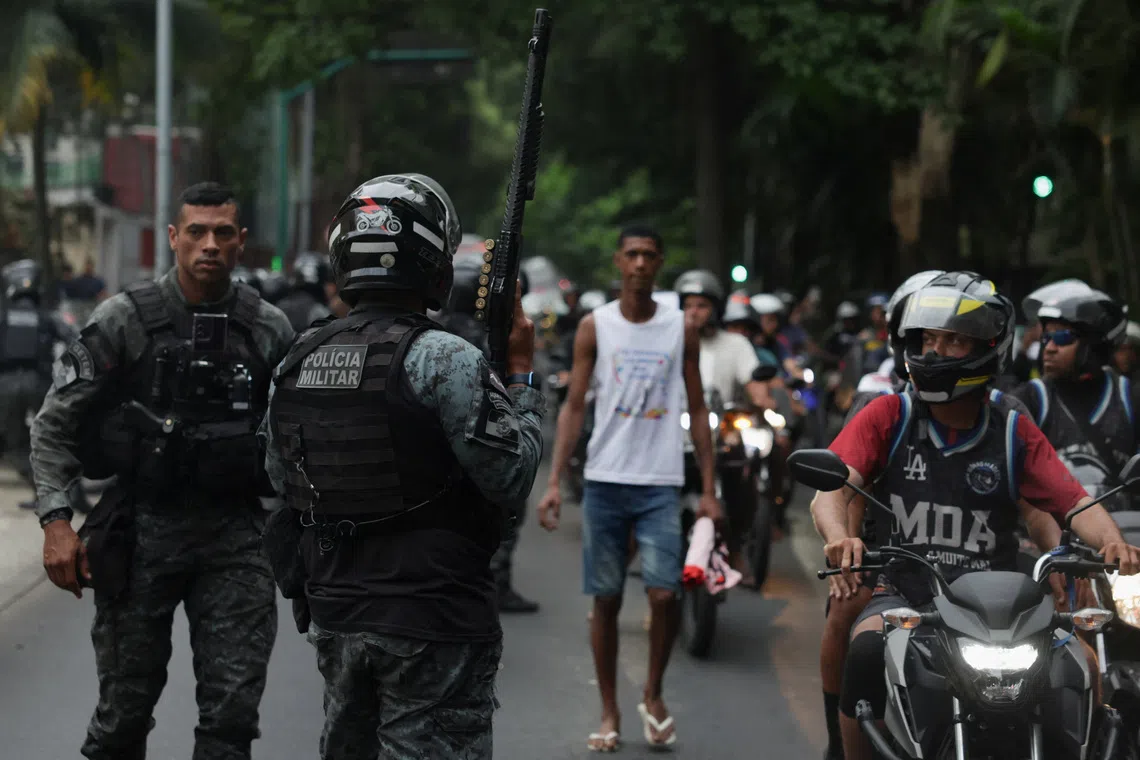Calls for tougher stance on gangs grow in Brazil after deadly Rio raid
Sign up now: Get ST's newsletters delivered to your inbox

Law enforcement officers standing guard as residents demonstrate outside the government palace in Rio de Janeiro, on Oct 29.
PHOTO: REUTERS
RIO DE JANEIRO – Tough measures against narco gangs, typically pushed by Brazil’s right, are gaining traction in a country weary of violence, after the deadliest police operation in the history of Rio de Janeiro laid bare the scale of its battle with organised crime.
On Oct 28, the massive police operation left at least 117 suspected criminals and four police officers dead
Rio’s conservative state governor Claudio Castro hailed the operation as a “success” against “narcoterrorism”, even as activists voiced their horror at harrowing images of bodies lined up in the street.
A group of lawmakers aligned with former far-right president Jair Bolsonaro on Oct 30 voiced their support for the offensive against Comando Vermelho (Red Command) – one of the oldest and most powerful gangs in the country, which controls large swathes of Rio de Janeiro.
After meeting the security chiefs behind the operation, the lawmakers announced they would fast-track a Bill to designate Comando Vermelho and First Capital Command – Brazil’s two largest criminal factions – as “terrorist organisations”.
The proposal “is on track to be voted on” in the Lower House, said lawmaker Chris Tonietto of the right-wing Liberal Party.
“It will be another step forward in the fight against organised crime,” she told a press conference.
Standing beside her, Rio’s civil police chief Felipe Curi said the bill would allow security forces to use more lethal weapons to “neutralise” criminals.
“Brazilian legislation is extremely lenient,” said Mr Curi.
Even leftist President Luiz Inacio Lula da Silva, accused by critics of being soft on crime, sought to project a tougher stance against the gangs in his response to the raid.
“We cannot accept that organised crime continues to destroy families, oppress residents, and spread drugs and violence throughout the cities,” Mr Lula wrote on the X social media platform.
However, he stressed that drug trafficking must be tackled without “putting police or civilians at risk”.
On Oct 30, Mr Lula signed new measures into law to strengthen the fight against organised crime.
The police raid has drawn condemnation from human rights organisations, and the United Nations has called for an investigation.
Relatives of some of the victims denounced summary executions. An AFP journalist on the scene saw a decapitated body.
‘Effective and necessary’
However, local media also published images of heavily-armed gang members in military gear preparing for the clash with police, and the operation which paralysed the city was seen as necessary among residents frustrated by chronic insecurity.
“The operation was timely, effective and necessary. It should even have happened sooner, today people don’t feel safe on the streets; you leave home not knowing if you’ll make it back,” said Mr Anselmo Pereira, a 67-year-old retiree from Meier, a middle-class neighbourhood in northern Rio.
Based on the online activity of nearly two million Brazilians after the raid, a study by the Getulio Vargas Foundation found sharp political polarisation and mounting public pressure for the authorities to take action against crime, the G1 news portal reported on Oct 30.
Also on the same day, Senator Flavio Bolsonaro, son of the former president, said he and his brother, congressman Eduardo Bolsonaro, would travel to El Salvador to learn from President Nayib Bukele’s hardline anti-gang model – praised for drastically reducing crime but condemned by rights groups for mass arrests and alleged abuses.
Last week, Mr Flavio Bolsonaro suggested that the United States should bomb boats off Rio de Janeiro, as it is doing in its campaign against so-called “narcoterrorism” in the Caribbean under President Donald Trump.
Popular far-right congressman Nikolas Ferreira, who has 19 million Instagram followers, posted an image of El Salvador’s famed mega-prison with hundreds of naked gang members, captioned: “This is my idea. You’ve been warned.” AFP


